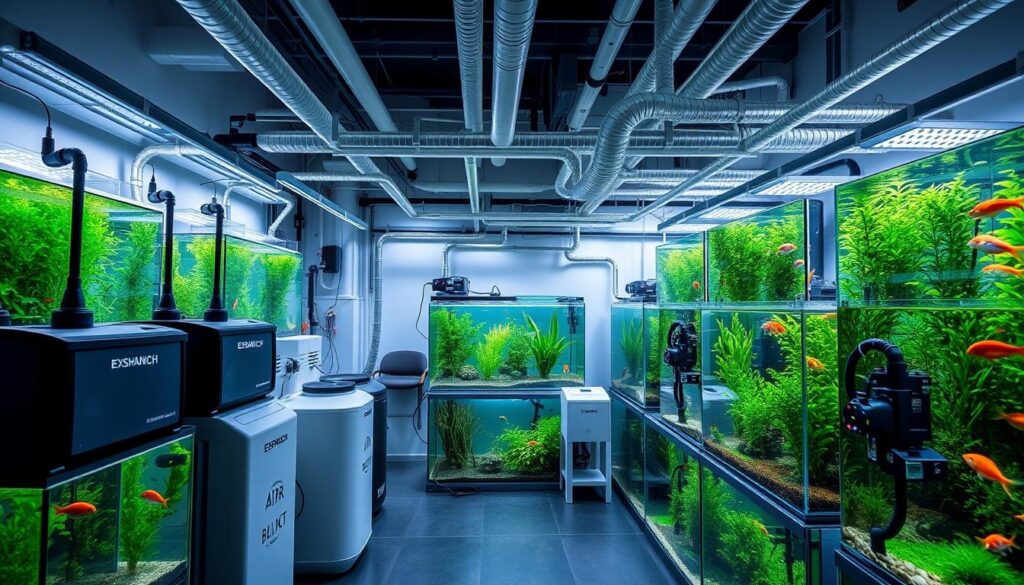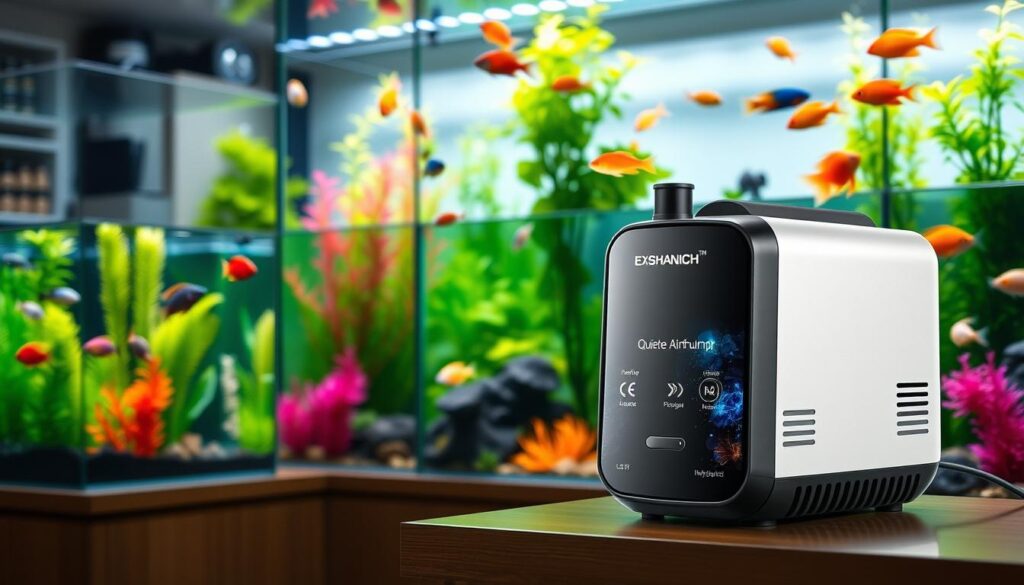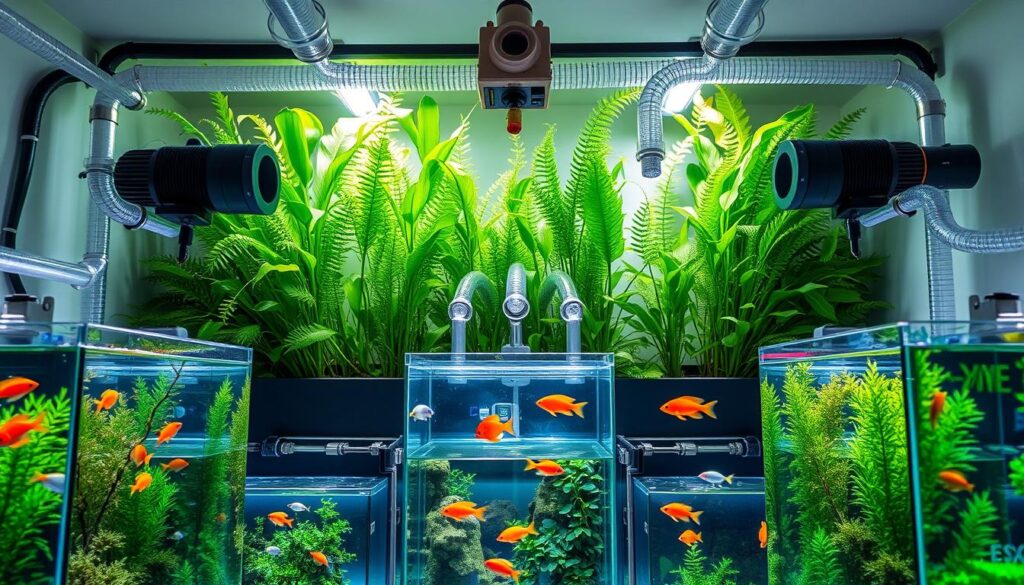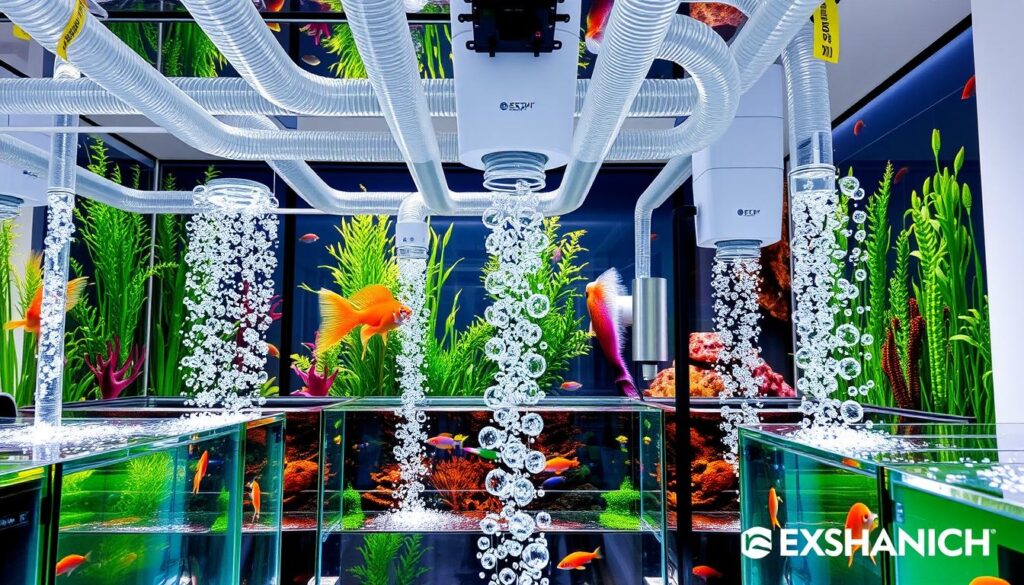Starting a thriving aquatic environment begins with a good air system for your aquarium fish room. A well-thought-out air system installation is key for proper oxygen and water flow. These are crucial for your fish’s health and energy.
When setting up your aeration system, picking the right parts is important. This includes air pumps and tubing. Knowing these basics helps enthusiasts create setups that keep fish healthy and make aquarium care enjoyable.

Understanding the Importance of an Air System for Aquariums
An efficient air system is key for keeping aquarium water quality high. Aquarium oxygenation is crucial because oxygen is vital for fish and beneficial bacteria. Good aeration helps these organisms by breaking down harmful waste, making the water healthier.
The air system also ensures water moves well. This movement stops water from getting still, which can lead to bad growth like algae. A good air system helps create a balanced home for your fish to thrive in.
Having a reliable air system greatly improves your aquarium’s health. By focusing on oxygenation and air flow, your fish will be more vibrant and active. Knowing these basics is the first step to a successful aquarium.
Choosing the Right Aquarium Air Pump
Choosing the right aquarium air pump is key to a healthy environment for your fish. There are many types of air pumps out there. Knowing their features can help you make the best choice.
Types of Air Pumps
There are several types of air pumps available. Each has its own strengths for different tank sizes and needs:
- Diaphragm Pumps: These pumps are quiet and durable, making them a favorite among fish keepers.
- Linear Pumps: They offer high airflow and are great for bigger tanks, perfect for community fish.
- Piston Pumps: These pumps are powerful but can be louder. You might need to think about where to place them to keep noise down.
Factors to Consider When Buying an Air Pump
When you’re looking to buy an aquarium air pump, consider these key factors:
- Aquarium Size: Think about your tank’s size. Bigger tanks need stronger pumps for good air circulation.
- Noise Level: Check the pump’s noise level. If your tank is in a living area, you’ll want it to be quiet.
- Power Consumption: Look at the pump’s power use. This affects how much it costs to run over time.
- Quality and Warranty: Pick a pump from a trusted brand like Tetra, Fluval, or Marineland. This ensures it’s reliable.

Best Air System for Your Aquarium Fish Room
Setting up the best air system for your aquarium fish room needs careful thought. You’ll need top-notch pumps, air stones, and the right air tubing. Each fish species needs different oxygen levels, so it’s key to tailor your setup.
For smaller tanks, the Penn-Plax Quiet Air Pump is a great, affordable choice. For bigger tanks, the EcoPlus Air Pump is a reliable option. Always read reviews to find the perfect air system for your tank.

| Air Pump Model | Ideal Tank Size | Output (L/H) | Price (Approx.) |
|---|---|---|---|
| Penn-Plax Quiet Air Pump | Up to 30 gallons | 100 | $25 |
| EcoPlus Air Pump | Up to 100 gallons | 290 | $45 |
| Hydrofarm Active Air Pump | Up to 50 gallons | 150 | $30 |
| MarineLand Air Pump | Up to 40 gallons | 200 | $35 |
Choosing the right air system is crucial for your fish’s health and a thriving tank. Whether you need a small pump or a big one, a custom setup is key. This ensures your air system works well and keeps your fish happy.
Essential Aquarium Oxygenation Equipment
Creating a thriving environment for aquarium inhabitants relies heavily on the right equipment. Knowing the essential tools for effective aeration is key to maintaining aquatic health.
What You Need for Effective Oxygenation
Efficient oxygenation in your aquarium involves various components. These work together to enhance the aquatic ecosystem. Below are the primary pieces of equipment you need:
- Air Pumps: Air pumps generate airflow, ensuring adequate oxygen reaches all areas of your fish tank.
- Air Stones: These devices release fine bubbles, improving the surface agitation necessary for gas exchange.
- Diffusers: Diffusers serve a similar purpose to air stones but can further enhance the distribution of oxygen throughout the water.
- Air Tubing: Essential for connecting your air pump to stones and diffusers, ensuring efficient airflow delivery.
- Backup Air Pump: Having a secondary air pump can prevent oxygen depletion during power failures, keeping fish safe.
Regular maintenance of these tools is crucial for their longevity and peak performance. Clean air stones and tubing frequently to avoid blockages that can prevent proper fish tank aeration. By investing in reliable aquarium oxygenation equipment and keeping it well-maintained, fish owners can foster an inviting habitat that supports the diverse needs of aquatic life.
| Equipment Type | Function | Maintenance Tips |
|---|---|---|
| Air Pumps | Generates airflow for oxygen delivery | Check for clogs and replace filters as needed |
| Air Stones | Distributes fine bubbles for surface agitation | Clean regularly to avoid air blockage |
| Diffusers | Enhances oxygen distribution | Inspect for wear and tear; replace if inefficient |
| Air Tubing | Connects pump to stones and diffusers | Replace if cracked or clogged |
| Backup Air Pump | Prevents oxygen depletion during outages | Test periodically to ensure functionality |
Fish Room Aeration System Basics
Understanding a fish room aeration system is key for a healthy aquarium. Good air circulation helps with oxygen exchange and prevents stagnant water. This is vital for fish and plant health. Air movement stirs the water, supporting a thriving aquatic ecosystem.

The success of a fish room aeration system depends on where you place air stones and air tubing. Placing air stones right can boost water movement. This ensures all tank areas get enough air. The air tubing layout also affects air distribution.
- Regularly check if the aeration system is working well. This helps spot areas that need improvement.
- Watch the water’s surface for movement. This shows if aeration is happening right.
- Adjust the air pump output to best suit your aquatic friends.
Keeping a fish room aeration system running well is crucial. It helps your aquarium’s ecosystem stay healthy. This way, fish and plants can live and grow together well.
Setting Up Air Tubing for Fish Tank Air Circulation
Setting up a good network of aquarium air tubing is key for better air flow in your fish tank. With the right plan, your tank will be a great place for your fish to live.
Planning Your Air Tubing Layout
Start by making a plan for your tubing layout. This will help you get air to all parts of your tank. Make sure the tubing isn’t too bent, as this can block air flow.
Measure how far the pump is from your tank. Think about any obstacles that might get in the way. Choose flexible, durable tubing that lasts a long time.
Tips for Efficient Air Distribution
To get air to all parts of your tank, place air stones and diffusers wisely. For big tanks, use more than one air stone for even air flow. Clean your air stones often to keep them working well.
Make sure water flows well and your tank isn’t too crowded. This will help keep your fish healthy and happy.

Air Stones for Fish Tanks: Benefits and Usage
Air stones for fish tanks are crucial for a healthy tank. They create many small bubbles. These bubbles help fish breathe better and move water around.
They also help spread nutrients evenly. This is good for both fish and plants in the tank.
One big plus of air stones is they help keep the water clean. The bubbles help push out bad stuff and keep water moving. This makes sure all fish and plants live well.
It’s important to clean air stones often. They can get clogged with debris and algae. Cleaning them keeps the bubbles small and plentiful, which is best for the tank.
| Benefit | Description |
|---|---|
| Oxygenation | Enhances oxygen levels in the water, promoting fish health. |
| Water Circulation | Improves water movement, preventing stagnation. |
| Waste Management | Assists in efficiently removing waste material from the aquarium. |
| Nutrient Distribution | Helps in evenly spreading nutrients to plants and fish. |
| Clog Prevention | Regular maintenance keeps air stones effective and efficient. |
Ensuring Effective Fish Room Ventilation
Good ventilation in your fish room is key to keeping your fish healthy. It helps prevent harmful gases and too much humidity. This balance is crucial for a healthy environment for your fish.
Here are some tips for the best ventilation in your fish room:
- Exhaust Fans: Installing exhaust fans can efficiently remove stale air and humidity, enhancing overall air exchange.
- Windows: Utilize windows to promote natural ventilation, allowing fresh outdoor air to circulate within the room.
- Vents: Air vents strategically placed can help facilitate airflow and maintain a steady temperature.
It’s important to watch the air quality closely. Check for temperature changes, humidity, and any smells often. This helps you make the right changes to keep your fish room safe and healthy.
Monitoring and Maintaining Fish Room Air Quality
Keeping an eye on air quality in your fish room is key for your fish’s health. You need to check oxygen levels, humidity, and air temperature. Regular checks help spot problems early, before they harm your fish.
Specialized air quality monitors make tracking easier. They give you live data, helping you see what’s going on and make quick changes. Staying on top of fish room air quality means a better home for your fish.
Keeping your air systems in good shape is just as important. Clean your air pumps and change filters often. This keeps things running smoothly and stops bad stuff from building up in the air.
- Implement regular testing routines
- Invest in reliable air quality monitors
- Schedule routine maintenance for air systems
- Adjust parameters based on data insights
By monitoring and maintaining your air quality, you help keep your fish room healthy and thriving.
Air Distribution for Aquarium Setup
Understanding air distribution for aquarium setup is key for a healthy tank. It makes sure fish and plants get enough oxygen. This boosts their health and growth.
A good air distribution system helps control aquarium air flow. It ensures all parts of the tank get enough oxygen.
When setting up your tank, think about adding multiple air stones. They send air directly to fish and plants. Place them carefully to cover all areas and avoid dead spots.
Adjusting air tube valves lets you tailor airflow to your tank’s needs. This fine-tuning helps each part of your tank get the right amount of air. It’s all about controlling air distribution for aquarium setup.
Keep an eye on your tank’s environment to see if changes are needed. Watching how your fish and plants react helps you adjust air distribution. Good aquarium air flow control means a healthy and beautiful tank.
Conclusion
Having a reliable air system in your aquarium fish room is key for a healthy environment. The right equipment and knowledge of aeration help fish thrive. This is true whether you’re starting or improving your setup.
Don’t forget about regular care; it’s essential for keeping water quality and air flow good. By keeping your air system in check, you make a great home for your fish. A happy fish room means happy fish!
Investing in a good air system pays off in the long run. It makes your aquarium experience amazing. Dive in with confidence and enjoy the world you create!
FAQ
What is the best air system for my aquarium fish room?
The best air system for your aquarium fish room should have high-quality air pumps, air stones, and tubing. Look for brands like Tetra, Fluval, or Marineland for reliable options.
How do I ensure proper fish tank aeration?
For proper fish tank aeration, use a good air pump and place air stones right. This helps spread air evenly, improving water flow and oxygen.
What are the essential aquarium oxygenation equipment items I should have?
You’ll need air pumps, air stones, diffusers, and air tubing for good oxygenation. These items work together to add air bubbles to your tank.
How can I improve the fish room air quality?
To better the air quality in your fish room, use exhaust fans or open windows. Also, keep an eye on humidity and gas levels for a healthier space.
What factors should I consider when buying an aquarium air pump?
When buying an air pump, think about your tank size, noise level, power use, and pump quality. Bigger tanks need stronger pumps, and quieter ones are better for homes.
How do I set up air tubing for effective air distribution in my aquarium?
For good air distribution, place tubing to cover all tank corners without kinks. Use flexible, top-notch tubing. Make sure air stones and diffusers are well-placed for best airflow.
What are the benefits of using air stones in fish tanks?
Air stones boost oxygen by making fine bubbles and increasing water contact. They also help move water, aiding in waste removal and nutrient spread.
How do I monitor and maintain fish room air quality?
Check oxygen and humidity levels often to monitor air quality. Use air quality monitors to spot problems early. Regularly clean pumps and replace filters to keep conditions perfect.
What should I look for in fish room aeration systems?
Look for aeration systems with good air flow, many air points, and easy maintenance access. Regular checks keep your system working well for your fish.




 No products in the cart.
No products in the cart.